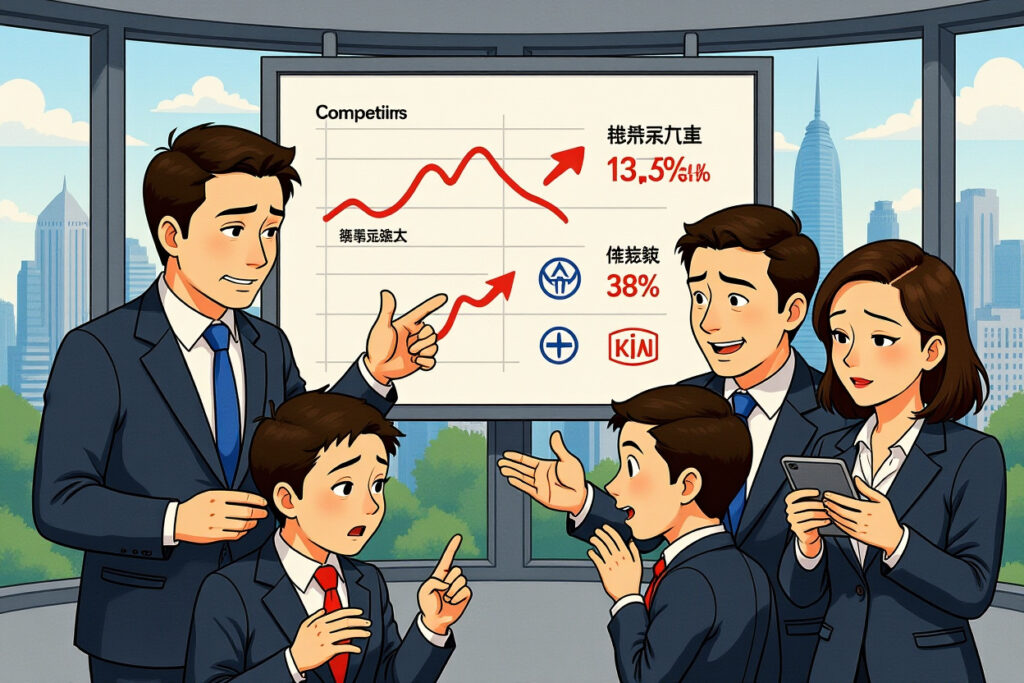The Sudden Departure of a Tech Executive
On September 9, 2025, the Chinese technology world was shaken when Wang Teng, former General Manager of Xiaomi’s China Region Market Department, took to social media to address swirling rumors about his abrupt departure from the smartphone giant. In a carefully worded statement on Weibo, Wang Teng directly addressed allegations that had been circulating across Chinese tech media platforms, emphatically stating that he had not engaged in corporate espionage or financial misconduct.
The controversy began when reports surfaced that Wang Teng had been terminated from his high-profile position at one of China’s most valuable technology companies. Initial leaks suggested possible involvement in leaking sensitive company information, potentially to competitors or third parties. In China’s hyper-competitive smartphone market, where companies like Xiaomi, Huawei, and Oppo vie for dominance, such allegations carry significant weight and can damage both corporate and personal reputations.
Wang Teng’s public response marked a rare instance of a senior tech executive directly addressing termination rumors in real-time. His statement highlighted the tension between corporate confidentiality and personal reputation management in China’s increasingly transparent digital ecosystem. The case offers fascinating insights into how technology companies handle internal disputes and the evolving nature of corporate governance in China’s dynamic tech sector.
The Allegations and Immediate Fallout
According to industry insiders, the initial reports suggested Wang Teng might have shared confidential product information ahead of official launches. In the smartphone industry, where product cycles are meticulously planned and market timing is crucial, such leaks can cost companies millions in lost competitive advantage. Xiaomi, known for its aggressive marketing and rapid product iteration, particularly values secrecy around upcoming devices.
The allegations gained traction quickly across Chinese social media platforms, with some commentators suggesting possible financial incentives behind the alleged information sharing. Others pointed to the intense pressure within China’s technology sector, where executives face tremendous performance expectations in a market that has seen slowing growth in recent quarters.
Wang Teng’s Public Defense Strategy
Wang Teng’s decision to address the allegations directly on Weibo represents a sophisticated approach to reputation management. Rather than allowing speculation to dominate the narrative, he chose to confront the rumors head-on with specific denials. His statement carefully distinguished between professional shortcomings and criminal behavior, acknowledging some form of performance failure while vehemently denying illegal activity.
This approach reflects evolving norms in China’s corporate culture, where social media platforms have become legitimate channels for crisis communication. Senior executives increasingly recognize that in the court of public opinion, timely and transparent communication can sometimes mitigate damage more effectively than traditional behind-the-scenes approaches.
Wang Teng’s statement specifically addressed two critical allegations: denies leaking company secrets for sale and denies accepting financial compensation for information sharing. By making these denials explicit, he created clear boundaries around what he was and wasn’t admitting to, potentially limiting the spread of more damaging speculation.
The Language of Corporate Apologies in Chinese Culture
Wang Teng’s statement included elements familiar in Chinese corporate apologies – acknowledgment of some failure (without specifying details), expression of reflection, and deflection toward positive future developments. His suggestion that people should focus on Xiaomi’s upcoming products rather than his departure aligns with cultural preferences for maintaining harmony and forward-looking perspectives.
This approach contrasts with Western corporate communications where specifics are often demanded. In China’s business environment, vagueness about exact failures sometimes serves multiple purposes: it allows the company to save face, enables the individual to move on without excessive stigma, and prevents competitors from gaining insight into internal weaknesses.
Xiaomi’s Corporate Culture and Information Security
Xiaomi has built its reputation on innovation and aggressive market expansion. Founded in 2010, the company rapidly grew to become one of the world’s leading smartphone manufacturers, known for its value pricing and savvy marketing. This growth has occurred within China’s highly competitive technology landscape, where information security becomes increasingly crucial as companies expand internationally.
The company’s approach to corporate secrecy reflects broader industry patterns in China’s technology sector. As companies like Xiaomi expand globally, they face increasing pressure to adopt international standards of corporate governance while maintaining the aggressive competitive tactics that fueled their initial growth. This tension sometimes creates vulnerabilities in information management systems.
Xiaomi’s response to the Wang Teng situation – or lack of public response – suggests a carefully calibrated approach to internal matters. Unlike some Western companies that might issue detailed statements about executive departures, Chinese technology firms often prefer to handle such matters privately, allowing public attention to shift to products and performance rather than personnel issues.
Information Security in Chinese Tech Companies
Chinese technology companies have significantly strengthened their information security protocols in recent years, particularly as they expand into Western markets with stricter data protection regulations. Companies like Xiaomi employ sophisticated digital rights management systems, compartmentalized information access, and rigorous employee training on confidentiality obligations.
The fact that allegations of information leakage could surface around a senior executive like Wang Teng suggests either exceptional circumstances or possible gaps in these security systems. Industry analysts note that as Chinese companies accelerate innovation cycles, the pressure to share information across departments sometimes conflicts with ideal security protocols.
Broader Implications for China’s Technology Industry
The Wang Teng situation reflects larger patterns in China’s technology sector, where rapid growth has sometimes outpaced the development of robust corporate governance structures. As companies like Xiaomi, Huawei, and Tencent become global players, they face increasing scrutiny from international investors, regulators, and consumers regarding their internal practices.
Executive mobility within China’s technology sector remains high, with talent frequently moving between competitors. This fluid labor market creates natural tensions around information sharing and confidentiality. Companies must balance the benefits of hiring experienced executives from competitors against the risks of potential information leakage.
The case also highlights the evolving relationship between Chinese technology companies and social media platforms. Where once such matters might have been handled entirely privately, executives now must consider public perception and the court of social media opinion. Wang Teng’s decision to address the allegations directly on Weibo represents this new reality.
Regulatory Environment and Corporate Governance
China has significantly strengthened its corporate governance regulations in recent years, particularly regarding information disclosure and insider trading. The Cybersecurity Law of 2017 and subsequent regulations have created clearer frameworks for how companies should handle sensitive information. However, enforcement remains inconsistent, and cultural factors sometimes influence how rules are applied in practice.
For multinational companies operating in China, cases like Wang Teng’s serve as important reminders of the complex interplay between formal regulations and informal business practices. Understanding these nuances becomes increasingly important as Chinese technology companies expand globally and foreign companies deepen their China operations.
Lessons for Technology Companies Globally
The Wang Teng situation offers valuable lessons for technology companies worldwide regarding executive management, information security, and crisis communication. First, it highlights the importance of clear confidentiality agreements and regular training for all employees, particularly senior executives with access to sensitive information.
Second, it demonstrates the growing importance of social media in corporate reputation management. Companies need developed strategies for addressing rumors and allegations in real-time, rather than relying solely on traditional media relations approaches. Wang Teng’s direct engagement on Weibo, while unorthodox by some standards, effectively shaped the narrative around his departure.
Third, the case underscores the need for robust internal investigation processes before taking public action against employees. While Xiaomi has not disclosed its internal processes, the fact that Wang Teng felt compelled to make a public statement suggests potential gaps in how the situation was handled internally.
Best Practices in Information Security
Technology companies can learn several best practices from this situation. Implementing tiered information access systems ensures that executives only receive sensitive information on a need-to-know basis. Regular audits of information access and sharing can help identify potential vulnerabilities before they become crises.
Clear protocols for investigating potential information breaches, including preserving evidence and maintaining confidentiality during investigations, help ensure fair outcomes while protecting company interests. Finally, developing structured communication plans for addressing executive departures, whether voluntary or involuntary, can help manage public perception and maintain stakeholder confidence.
The Path Forward for Executive Accountability
As technology companies continue to dominate global business landscapes, cases like Wang Teng’s will likely become more common. The intense competition for talent, pressure for rapid innovation, and increasing value of information create perfect conditions for conflicts around executive conduct and information management.
Companies that develop transparent processes for handling such situations, balancing organizational security with individual rights, will likely fare best in both retaining talent and maintaining public trust. The evolving nature of social media adds complexity to these situations, requiring companies to be both swift and measured in their responses.
For executives like Wang Teng, the situation highlights the importance of maintaining clear boundaries around confidential information and understanding that in the digital age, allegations can spread rapidly regardless of their veracity. His approach of directly addressing the rumors while acknowledging some professional failure represents a potentially model approach for similar situations.
Industry-Wide Implications
The technology industry globally faces similar challenges around information security and executive conduct. As companies like Xiaomi continue to challenge established players in international markets, they bring both innovative approaches and learning opportunities regarding corporate governance. Cases like Wang Teng’s contribute to the evolving understanding of how best to balance competition, innovation, and ethical conduct in fast-moving technology sectors.
Looking ahead, we can expect increased attention to corporate governance standards in Chinese technology companies as they expand globally. International investors and partners will likely demand greater transparency around internal processes, including how companies handle executive transitions and investigate potential misconduct.
Final Thoughts on Corporate Conduct in the Digital Age
The Wang Teng situation illustrates the complex interplay between individual reputation, corporate security, and public perception in today’s technology industry. His emphatic statement that he did not leak company secrets or accept financial compensation represents both a personal defense and a reflection of broader industry tensions.
As technology continues to transform business practices and communication channels, companies and executives must navigate increasingly complex ethical and legal landscapes. Cases like this serve as important reminders that in the digital age, information moves rapidly, and perceptions can form before facts are fully established.
For technology professionals and companies alike, the lessons are clear: robust information security systems, clear communication protocols, and fair investigation processes are essential components of modern corporate governance. As the industry continues to evolve, those who master these elements will likely thrive, while those who neglect them may find themselves facing challenges similar to those revealed in the Wang Teng situation.
The coming months will likely reveal more about how Xiaomi handles such internal matters and whether Wang Teng’s public defense affects his future career prospects. Regardless of the outcome, this case has already contributed valuable insights into the evolving nature of corporate conduct and reputation management in China’s dynamic technology sector.




